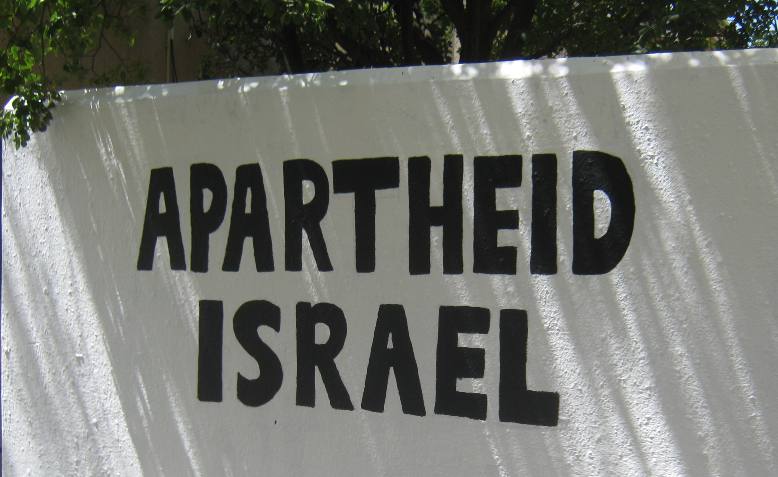 Apartheid Israel painted on a wall, Wits University Johannesburg. Photo: Life in General / Wikimedia Commons / cropped from original / CC BY 3.0, license linked at bottom of article
Apartheid Israel painted on a wall, Wits University Johannesburg. Photo: Life in General / Wikimedia Commons / cropped from original / CC BY 3.0, license linked at bottom of article
Following a recent report by Israeli human rights organisation B’Tselem which called Israel an apartheid state, Sybil Cock explains why the label fits
Apartheid, a term coined during white rule in South Africa, is defined by the International Criminal Court as an “institutionalized regime of systematic oppression and domination by one racial group.”
‘There is one regime governing the entire area and the people living in it, based on a single organizing principle,’ said B’Tselem.
The recent report from B’Tselem, Israel’s most important human rights NGO, that labels Israel as an apartheid state is significant.
The argument is not, of course, new. Palestine activists have been arguing the case for naming Israel as an apartheid state for years. A UN report endorsed this view a year ago, and researchers from South Africa have rigorously established the facts.
As respected Jewish scholar Tony Klug wrote in the Guardian recently:
‘Israel’s only defence against the accusation of apartheid is that its hold over the West Bank is a temporary occupation. If this is not its case, it doesn’t have a case. Even if it were its case, after some 53 years it would be running perilously thin’
The bones of the argument are these:
1Palestinians in the Occupied West Bank live under military occupation. There is no freedom of movement for them, and they live under military law. The limited powers of the Palestine Authority, which is an ‘interim government’ are wholly constrained by Israel. Any Israeli soldier can stop and search even the highest-ranking officials. Human rights abuses, including the arrest and killing of unarmed civilians, including children are daily occurrences. Israelis in the West Bank (settlers living on stolen land), on the other hand, have full Israeli citizenship rights.
2Palestinians in Gaza are under siege. The strip is overcrowded and surrounded by Israel and hostile Egypt. The area of the Mediterranean in which Gazans can fish unmolested by the Israeli navy is tiny. Gaza is an open-air prison.
3Palestinians in East Jerusalem (captured by Israel in 1967) are stateless and at constant risk of losing their residency in the city. 35% of land in East Jerusalem has been confiscated for settler use, and Israel is open in its desire to remove as many Palestinians as possible. Forced displacement, house demolitions and settler violence are daily occurrences.
4Palestinian citizens of Israel face massive economic discrimination and restrictions on where they can live. Although they can vote, the Israeli state, with the recent Nation State law, has codified apartheid: “the right to exercise national self-determination in the State of Israel is unique to the Jewish people.”
5Nearly 6 million Palestinians are registered as refugees by the UN. They live in dire conditions in camps across the Middle East. A million more are unregistered. They are all seeking the Right of Return to the lands stolen from them by Israel in 1948 or 1967. Every Jew in the world has the right to ‘return’, to go and live in Israel.
So, why does B’tselem’s intervention matter? B’tselem does not even support the Palestinian Right of Return. It does not acknowledge that the state of Israel was founded on separatism in 1948. And, of course, Palestinians have been saying Israel is an apartheid state for decades, based on their daily lives.
They are listened to because they are Israeli, and very clearly a Human Rights group. Their report gained some publicity in the mainstream media, leading to a Guardian editorial which essentially endorsed B’tselem’s view.
But it is important for another reason. The TUC acknowledged Israeli apartheid in September, extending the possibilities for union-based campaigning for Palestine.
Counterfire’s supporters should be arguing for their union branches to affiliate to the Palestine Solidarity Campaign. The AGM for members is in April.
Before you go
The ongoing genocide in Gaza, Starmer’s austerity and the danger of a resurgent far right demonstrate the urgent need for socialist organisation and ideas. Counterfire has been central to the Palestine revolt and we are committed to building mass, united movements of resistance. Become a member today and join the fightback.

